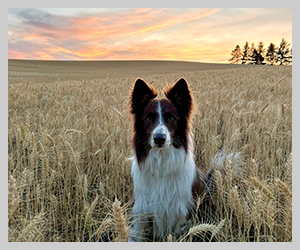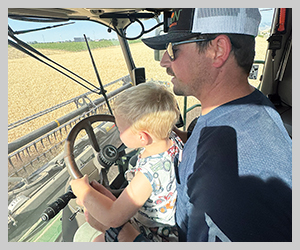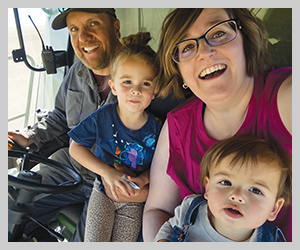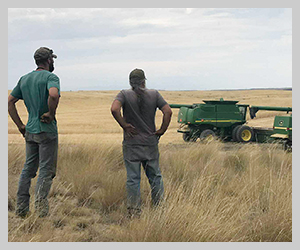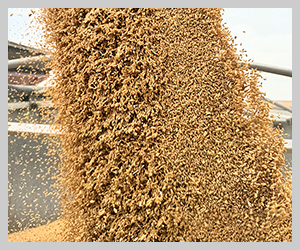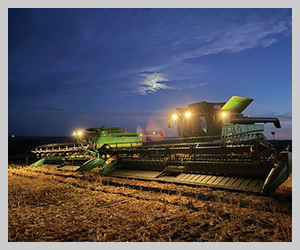Healthy mind, healthy farms AMMO session focuses on farmer mental health
2025April 2025
By Trista Crossley
Editor

Last month, a group of Washington wheat growers took steps to overcome the stigma of mental health by addressing suicide myths, learning to recognize the signs of suffering, and finding help for somebody in crisis. The session concluded the Agricultural Marketing and Management Organization’s winter schedule.
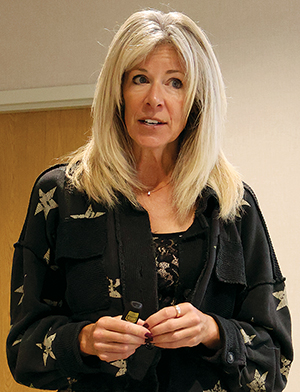
The session was led by Darla Tyler-McSherry, founder of Ask In Earnest. Tyler-McSherry grew up on a wheat farm in Montana and spent 30 years working in student health at Montana State University Billings. Despite her experience, even she was caught off guard when her father died by suicide in 2016. A few years later, Tyler-McSherry began Ask In Earnest, an initiative addressing mental health in agriculture. Ask In Earnest trains people to recognize the signs of somebody struggling with mental health and provides tools and resources to start a difficult conversation.
“We are here to change the culture, the landscape, change that current, long-standing, and pervasive issue of mental health and poor mental health, farming, and suicide,” she told the group. “I used to believe that suicide was this horrible, awful tragic event, and that it happened to other people. That all changed for me. My dad, Dick Tyler, was a wheat farmer in Big Sandy, Mont. Dad was born on the farm in the farmhouse that my brother and I were raised in. My dad spent his whole life on the farm. He died on the farm by his own hand.”
The Centers for Disease Control and Prevention has found that agriculture has one of the highest rates of suicide when compared to the general working population. Across the nation, between 2002-22, suicide rates increased 30%, while in rural America, they increased 46%.
In Washington state, suicide rates have increased 12% in the past 20 years. Age matters, when dealing with suicide. Older farmers are more at risk, with 45% of suicides involving farmers 65 and older, with health issues being one of the primary risk factors. Younger farmers are also more at risk, with that age group’s primary risk factor being the loss of a relationship, such as a death or divorce.
Tyler-McSherry referred to an idea from Iowa psychologist and farmer, Michael Rosmann, called the Agrarian Imperative, about why farmers are more at risk for mental health problems: Like many animal species, humans have a basic need to acquire sufficient territory and the necessary resources (e.g., capital, equipment, buildings, livestock) to produce the food and shelter required by their families and communities … This genetically programmed instinct drives farmers to hang onto their land at all costs. The agrarian imperative instills farmers to work incredibly hard, to tolerate unusual pain and adversity, to trust their own judgment, and to take uncommon risks.
“Those qualities that make you a good farmer also make you susceptible to mental health problems,” she said. “That can put farmers at an increased risk because they are so used to doing things alone.”
Myths about suicide
- Most suicides happen without warning. False. Most people display some signs, but those signs can be easily missed or go unrecognized. The day before Tyler-McSherry’s father died, he said something that sounded odd, and the family didn’t pick up on it. “We know what we know at the time, but the key thing to helping prevent suicide is to look and hear things in a different way so we can pick up on those signs. If somebody is going to telegraph it, they will say something to somebody specific, probably someone close to them.”
- People who die by suicide are selfish and take the easy way out. False. In reality, they are in so much pain, their judgement is so clouded that they can’t think rationally. They can’t make good decisions when they are under that much stress.
- Once someone is suicidal, they will always be suicidal. False. Up to 90% of people who live through a suicide attempt won’t go on to make a second attempt, especially if they get connected to professional help.
- Talking about suicide causes it. False. There’s no research to support this idea, and the opposite may actually be true. Asking if a person is suicidal can give that person a sense of relief; it can throw a lifeline to them.
- Strong people don’t kill themselves. False. It’s a myth that it is a sign of weakness if one is struggling mentally, or it is wrong to have a mental health condition. “Just like we all have physical health, we all have mental health.”
Risk factors
- Work/life balance. Farmers don’t have the physical and psychological division from work, since they usually live on the farm or ranch. Their work is also their entire life, and it’s hard to have that separation.
- Economics. There’s been a 23% decrease in farm income in recent years, making it harder to make a living as a producer.
- Language/culture of farming can also place one at risk. Many farmers don’t have the language or the culture to ask for help when it comes to mental health. Our culture doesn’t make it easy for men to say they’re hurting psychologically and need help.
- Lack of or a reluctance to seek mental health services.
- Alcohol use as a coping strategy.
- Access to lethal means. On a farm or ranch, there are lots of ways to harm oneself and take your own life.
- Climate stress. No matter where you land on what you think about climate stress, the data shows it is stressing farmers out. A survey of 100 Montana farmers, found that 70% agree that climate change is impacting their bottom line. Nearly 75% said they have moderate to high anxiety when they think about climate change.
- Lack of Vitamin D. Studies show that if you live in places with lots of cloud cover, lower levels of Vitamin D are correlated with higher levels of depression. It might be worthwhile to have a conversation with a medical care provider about supplements.
- Mental health condition. Up to 90% of people lost to suicide have an untreated condition, such as depression or alcoholism.
- Social isolation. When you are isolated, you have fewer opportunities to make connections. Farmers have a lot of rural space and a lot of isolation; people are social creatures.
- Stigma. Farmers talk about their knee replacement, but find it difficult to talk about struggling with anxiety or depression.
Warning signs
- Listen. Pay more attention to what people are saying, doing, or how they are behaving. There are three specific things to pay attention to. They talk about being a BURDEN, even if it is only a perceived burden. They talk about LOSING HOPE. They don’t see a FUTURE FOR THEMSELVES. “It might not be direct, it might be veiled, so we need to slow down and listen.”
- Mood. Pay attention to people’s moods. Do they seem depressed and not themselves, with no laughter or lightness? Conversely, if a person seemed depressed for a long time and then, suddenly, they aren’t, they may have been struggling with thinking about suicide and have decided they are going to make an attempt. “This is not happiness, but it’s coming out as relief.”
- Actions. Is that person talking about buying another gun, or are they stockpiling medications? Are they more angry and expressing that anger? Is that anger out of character for that person? You might also see a lot of withdrawal from friends and activities they used to enjoy.
Action steps
- Restrict access to lethal means.
- Put TIME and DISTANCE between suicidal thoughts and actions. Research has found that the time from planning to attempting suicide is short, counted in hours, not days. Suicidal thoughts come in waves. In Washington, about half of all suicides involve the use of a firearm. A conversation around that might sound like, “I’m really worried about you. I know you are having a bad time lately, and things not going well. If you are thinking about suicide, let me babysit your guns and ammo for awhile. Let’s get you in a better spot, and then I’ll give them back to you.” You might think that person would never give up their guns and ammo, but you might be surprised at how much relief that person might feel because it takes that risk away.
- Call 988 before that moment of crisis. You can call 988 and tell them you are really worried about a friend and think they might be thinking about suicide. You can get solid advice and concrete steps to start that conversation. You can also text “go” or “start” or “help” to 988 or chat online at 988lifeline.org.
- Go to your local emergency room.
- Help that person connect with help.
- Gatekeeper training, such as QPR (Question, Persuade, Refer, which is like CPR for suicide), or COMET (Changing Our Mental and Emotional Trajectory). “Let’s make it normal to get trained in programs like QPR and COMET.”
- Look for training opportunities from places like the county health department or the county Extension office.
Resources
- American Farm Bureau State of Mind (fb.org/initiative/farm-state-of-mind).
- American Foundation for Suicide Prevention (afsp.org).
- Togetherall (togetherall.com/en-us/).
- AgriSafe Network (agrisafe.org).
- Western Regional Agricultural Stress Assistance Program (farmstress.us).
- Ask in Earnest (askinearnest.org).
- Farm Aid Call Center (800-FARM-AID 6 a.m. to 7 p.m. MST).
- AgriStress Helpline (833-897-2474).





